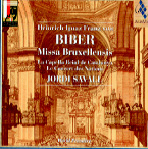The technology at our command, the electronic images we see every day, the ease and swiftness of world travel and communication has left modern humans with a waning sense of awe. We can argue about who was or is better off, but for 17th century Europeans, awe-inspiring events happened with some regularity. Pageantry was one of the more effective and popular means to impress a congregation, and there was nothing like a huge celebration in a massive cathedral to remind each person of his place in the grand scheme.
Composer Heinrich Biber, who was in charge of the music at the great Salzburg Cathedral in the late 17th century, really rose to such an occasion in 1682 when he composed his monumental 53-voice Missa Salisburgensis to celebrate the anniversary of the founding of the Salzburg archbishopric. This work (recorded a couple of years ago by Paul McCreesh for Archiv) must have raised its audience from its collective seat with the sheer power of its performing forces and Biber’s all-stops-open scoring that fully exploits the varied timbres and textures of brass, strings, and voices. It doesn’t take long to realize that, with the Missa Bruxellensis, he’s done it again, only this time, he employs “only” 23 voices. Remarkably, the occasion for which this work was written is not certain–its name refers only to where the manuscript was found–but its date of composition was probably around 1700. (In fact, the composer of these two masses isn’t even absolutely certain, but modern scholarship has all but determined that they are the work of Biber.)
Importantly, the work’s impact is best realized not just by duplicating the required number of performers, but by positioning them properly in the cathedral for which the work was designed. This world premiere recording tries to do just that, placing the five different groups of singers and instrumental choirs exactly where they would have stood 300 years ago. To say the least, hearing walls of sound hurled from one choir to its counterpart in the loft across the aisle, mixing with the rising tones from the orchestra below, joined by four organs and two ensembles of winds and brass, all resonating for long seconds throughout the soaring Salzburg Cathedral nave is a memorable experience. This is music on the grandest imaginable scale.
Of course, we know the effect loses something on a recording, but it’s hard to complain about the results of this tremendous effort by Jordi Savall and his impressive cast of musicians and recording team. The huge echoing performing space dictated a more or less consistently homophonic texture, so the music doesn’t offer much in the way of linear intricacy; however, there’s considerable variety in the use of soloists and smaller concertato groups. The sound is vibrant and full-bodied, giving a real “feel” for the spacious environment and yet presenting voices and instruments with remarkable detail. To fully describe this recording event, we just may have to bring back the word “awesome”.
































